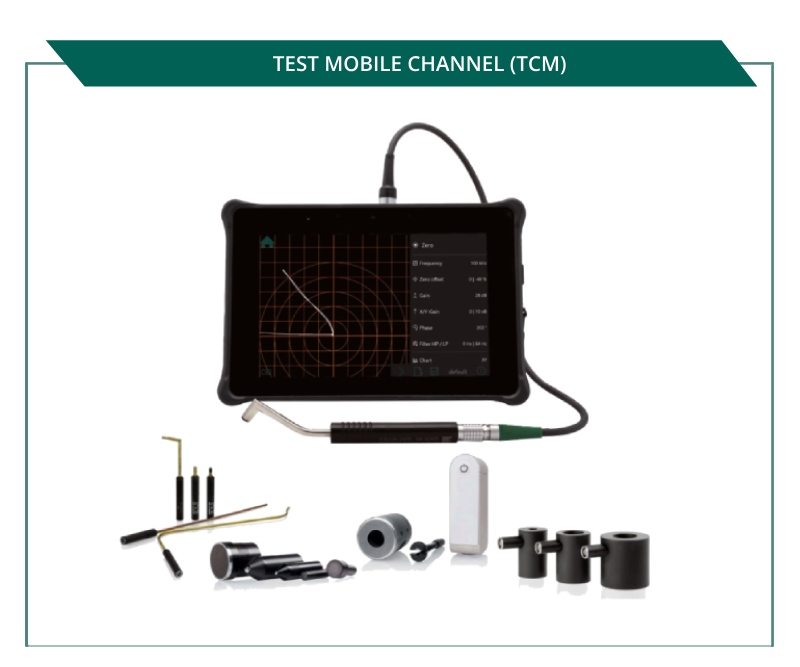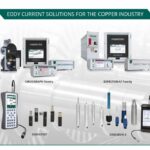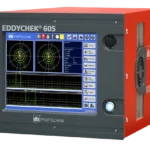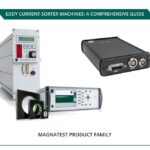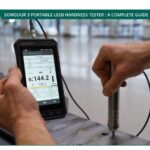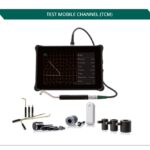Non-destructive testing (NDT) is essential for maintaining the quality, safety, and reliability of materials and structures in industries such as aerospace, automotive, and energy. While traditional NDT methods have served their purpose, advancements like eddy current testing now offer quicker and more accurate ways to detect cracks and flaws.
The FOERSTER TCM 2.142 is a portable eddy current crack detector that’s changing the game, offering powerful inspection solutions to industries around the world.
What is the FOERSTER TCM 2.142?
The FOERSTER TCM 2.142 is an advanced portable eddy current crack detection instrument for many applications. It combines multiple eddy current testing methods to inspect conductive materials for cracks or corrosion.
The eddy current test works by inducing a current flow in the material with a coil which generates a magnetic field. When there is a flaw or defect the disturbance in the magnetic field is measured to detect defects such as cracks and other structural damage.
Key Features of the TCM 2.142
Modular Testing Capabilities:
The FOERSTER TCM 2.142 features four specialized modules designed for specific testing needs:
- DEFECTOSCOP: Surface and sub-surface crack detection, weld inspection, material sorting, and borehole inspection.
- ECA (Eddy Current Array): Uses up to 512 sensors to scan large surfaces for cracks and defects.
- EC Measure: Wall thickness measurement, crucial for inspecting pipes and tubes for signs of corrosion or wear.
- SIGMATEST: Measures conductivity for material sorting and alloy testing.
Contact us and schedule for Demo video of the TCM 2.142
Why Request a Demo video?
- Real-time feedback for faster, more efficient inspections.
- Comprehensive defect detection with advanced multi-frequency and modular testing.
- Portable, durable design for field use in challenging environments.
Multi-Frequency Testing:
The eddy current testing equipment must be calibrated to ensure that it is functioning correctly and providing accurate results. The device allows eddy current inspection with multiple frequencies in parallel, ensuring a more thorough examination of both surface and sub-surface defects, even in ferromagnetic or non-ferromagnetic materials. Adjusting the frequencies optimizes depth of penetration for deeper defects.
Probes for Every Testing Need:
The TCM 2.142 works with specialized eddy current probes for different inspection scenarios, including:
- Absolute Probe: For detecting surface cracks and corrosion.
- Differential Probe: Increases sensitivity for small flaws.
- Rotating Probe: Ideal for cylindrical components like pipes, detecting surface defects and subsurface cracks.
Real-Time Detection:
The eddy current technology in the FOERSTER TCM 2.142 allows for real-time detection of defects. The device uses the alternating current principle to generate and measure eddy currents. This enables the detection of flaws in test objects and structural integrity inspection of components.
How Eddy Current Testing Works
Eddy current testing uses the principle of electromagnetism to detect flaws. A coil generates an alternating current, which induces an eddy current in the conductive material being tested. When there is a flaw or defect, the magnetic field changes, disrupting the flow of the eddy current, which is then measured. This allows for the detection of surface and subsurface flaws, corrosion, and cracks.
Applications in Critical Industries
Aerospace and Automotive Industries: Crack testing in critical components like turbine blades, engine parts, and welds. Eddy current crack detection for structural integrity in aircraft and automobile parts. Detection of corrosion under insulation and surface coatings to ensure components meet metallurgical standards.
Energy and Power: In-service inspection of pipelines and refinery structures to detect flaws like corrosion under insulation or cracks in materials.
Flaw detection and crack testing for ferrous and non-ferrous materials used in power plants, including austenitic stainless steels.
Railways and Infrastructure: Track inspection for surface and subsurface cracks in rails and infrastructure to ensure safety. Magnetic field testing for defects in large infrastructure components.
Non-Ferrous Metal Manufacturing: Material sorting and alloy testing with the SIGMATEST module to ensure quality control for aluminium, copper, and other non-ferrous metals.
Benefits of Using the TCM 2.142
- Portability: Lightweight and durable design for field use in various inspection environments.
- Real-Time Results: Immediate feedback helps streamline workflows and reduce inspection time.
- Versatility: The device supports different eddy current probes, ensuring it can handle a wide variety of inspection tasks.
- Advanced Technology: Combines eddy current technology with features like eddy current array for high-resolution imaging and multi-frequency support for comprehensive defect detection.
Testing Methods and Inspection Scenarios
The FOERSTER TCM 2.142 employs several testing methods and inspection techniques to detect cracks and flaws:
Eddy current method for surface detection of corrosion, cracks, and flaws.
Eddy current array for inspecting large surfaces and high-frequency scanning of deep defects.
Ultrasonic testing as an alternative to complement eddy current testing for certain inspection scenarios.
Conclusion
The FOERSTER TCM 2.142 portable crack detector or portable flaw detector is an invaluable tool for industries that rely on the safety and performance of critical components. With its non-destructive testing (NDT) capabilities, it combines cutting-edge eddy current technology with the versatility of modular testing solutions. Whether for crack detection, flaw detection, or material testing, this eddy current test instrument ensures accuracy, efficiency, and safety.
Contact us today to request a FREE Demo Video. To learn more about how the TCM 2.142 can streamline your inspections and improve your operational efficiency. Visit our website to request a demo video and explore our range of eddy current testing services and NDT techniques tailored to your needs.
Whether you’re in aerospace, automotive, energy, or any other critical industry, the TCM 2.142 can help you detect cracks, corrosion, and flaws faster and more accurately than ever before.
Frequently Asked Questions
What is the FOERSTER TCM 2.142 and how does it work?
The FOERSTER TCM 2.142 is a portable eddy current crack detector used for non-destructive testing (NDT) to detect cracks, corrosion, and other structural defects in conductive materials. It works by inducing an alternating current in a coil, generating a magnetic field. When a flaw is present in the material, it disturbs the magnetic field, and the device measures this disruption to identify surface and subsurface defects.
What industries can benefit from using the TCM 2.142?
The TCM 2.142 is widely used in industries such as aerospace, automotive, energy, railways, infrastructure, and non-ferrous metal manufacturing. It is ideal for inspecting critical components like turbine blades, engine parts, pipes, tracks, and metal alloys to ensure structural integrity and safety.
How does the TCM 2.142 improve crack detection over traditional methods?
The TCM 2.142 offers faster, more accurate detection compared to traditional methods like visual inspection or ultrasonic testing. It uses advanced eddy current technology, which can detect both surface and subsurface defects in real time, allowing for immediate feedback and more thorough inspections, especially in hard-to-reach or complex geometries.
What are the different modules available with the TCM 2.142, and what do they do?
The TCM 2.142 features four specialized modules:
– DEFECTOSCOP: Detects surface and subsurface cracks, weld inspection, and material sorting.
– ECA (Eddy Current Array) : Scans large surfaces with up to 512 sensors for high-resolution crack detection.
– EC Measure: Measures wall thickness for corrosion detection in pipes and tubes.
– SIGMATEST: Measures conductivity to assist in material sorting and alloy testing.
What types of probes are compatible with the TCM 2.142?
The TCM 2.142 supports various probes, including:
– Absolute Probe: For detecting surface cracks and corrosion.
– Differential Probe: Increases sensitivity for small flaws or subsurface defects.
– Rotating Probe: Ideal for inspecting cylindrical components like pipes, providing a comprehensive scan for surface and subsurface flaws.
Can the TCM 2.142 detect both ferromagnetic and non-ferromagnetic materials?
Yes, the TCM 2.142 can detect defects in both ferromagnetic and non-ferromagnetic materials. It is equipped with multi-frequency testing capabilities that allow for effective inspection in different materials, optimizing the depth of penetration and sensitivity to both surface and subsurface flaws.
How portable is the TCM 2.142, and is it suitable for field use?
The TCM 2.142 is designed to be lightweight and durable, making it ideal for field use. Its portable design ensures that it can be easily transported to various inspection sites, including remote locations, and used in challenging environments where traditional NDT equipment might be impractical.
What is the advantage of real-time defect detection with the TCM 2.142?
Real-time defect detection allows for immediate feedback during inspections, which helps streamline workflows and significantly reduces inspection times. The ability to detect flaws instantly also prevents delays in production and enhances the overall efficiency of maintenance processes.
How does multi-frequency testing benefit the TCM 2.142?
Multi-frequency testing allows the TCM 2.142 to examine defects at different depths. By adjusting the frequency of the eddy currents, the device can optimize its sensitivity to both shallow surface defects and deeper, subsurface flaws, providing a more thorough and accurate inspection of components.
How do I request a demo Video or get more information about the TCM 2.142?
You can email or visit the official website of FOERSTER to request a demo video of the TCM 2.142. The website also provides more details about the product’s capabilities, technical specifications, and additional NDT services available to help meet your inspection needs.



